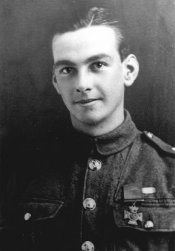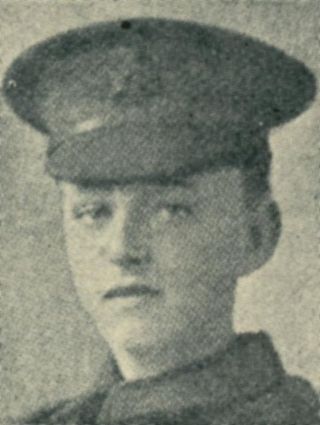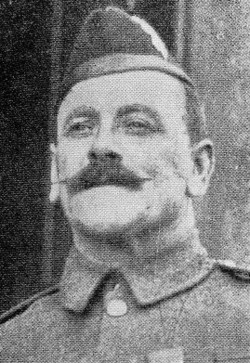
Douglas Walter Belcher was an English recipient of the Victoria Cross, the highest and most prestigious award for gallantry in the face of the enemy that can be awarded to British and Commonwealth forces.

Corporal Sidney William Ware VC was a British recipient of the Victoria Cross, the highest and most prestigious award for gallantry in the face of the enemy that can be awarded to British and Commonwealth forces.

Thomas Orde Lawder Wilkinson VC, was an English-born Canadian and British Army officer who was a recipient of the Victoria Cross (VC), the highest and most prestigious award for gallantry in the face of the enemy that can be awarded to British and Commonwealth forces. A soldier with the Loyal North Lancashire Regiment during the First World War, he was posthumously awarded the VC for his actions on 10 July 1916, during the Battle of the Somme.

Arthur Vickers VC was an English soldier and a recipient of the Victoria Cross, the highest and most prestigious award for gallantry in the face of the enemy that can be awarded to British and Commonwealth forces. He was also awarded the French Croix de Guerre.
James Towers, VC was an English soldier, farmer, and a recipient of the Victoria Cross (VC), the highest award for gallantry in the face of the enemy that can be awarded to British and Commonwealth forces. A soldier with The Cameronians during the First World War, he was awarded the VC for his actions on 6 October 1918, during the Hundred Days Offensive.

Sergeant Charles William Train VC was a British Army soldier and an English-born recipient of the Victoria Cross (VC), the highest British honour awarded for gallantry in the presence of the enemy. It was awarded in the First World War to British and Dominion forces and the Indian Army.
Sergeant Arthur Frederick Saunders VC was an English recipient of the Victoria Cross, the highest and most prestigious award for gallantry in the face of the enemy that can be awarded to British and Commonwealth forces.

Issy Smith was a British-Australian recipient of the Victoria Cross (VC), the highest award for gallantry in the face of the enemy that can be awarded to eligible forces of the Commonwealth and United Kingdom. In recognition of his VC, he was also awarded the French Croix de Guerre and Russian Cross of St. George by the respective governments.

William Buckingham VC was an English recipient of the Victoria Cross (VC), the highest and most prestigious award for gallantry in the face of the enemy that can be awarded to British and Commonwealth forces. He received the VC during the First World War, for his actions during the Battle of Neuve Chapelle in March 1915. He was killed the following year at Thiepval.

Harry Cator VC, MM was an English recipient of the Victoria Cross, the highest and most prestigious award for gallantry in the face of the enemy that can be awarded to British and Commonwealth forces.

Henry Edward Kenny VC, was an English recipient of the Victoria Cross, the highest and most prestigious award for gallantry in the face of the enemy that can be awarded to British and Commonwealth forces.

Company Quartermaster Sergeant Norman Harvey VC was a British Army soldier and an English recipient of the Victoria Cross, the highest and most prestigious award for gallantry in the face of the enemy that can be awarded to British and Commonwealth forces. He re-enlisted in World War II and was killed in action.

David Finlay VC was a Scottish recipient of the Victoria Cross, the highest and most prestigious award for gallantry in the face of the enemy that can be awarded to British and Commonwealth forces.

George Stanley Peachment VC was an English recipient of the Victoria Cross, the highest and most prestigious award for gallantry in the face of the enemy that can be awarded to British and Commonwealth forces.

John Ripley VC was a Scottish recipient of the Victoria Cross (VC), the highest and most prestigious award for gallantry in the face of the enemy that can be awarded to members of British and Commonwealth forces.

Sergeant Edward John Mott VC DCM was an English recipient of the Victoria Cross, the highest and most prestigious award for gallantry in the face of the enemy that can be awarded to British and Commonwealth forces.
Sergeant Harold Jackson VC was a British Army soldier and an English recipient of the Victoria Cross (VC), the highest and most prestigious award for gallantry in the face of the enemy that can be awarded to British and Commonwealth forces. A soldier with the East Yorkshire Regiment, he was awarded the VC for his actions in March 1918, during the German spring offensive of the First World War. He was killed in action five months later.

Major Benjamin Handley Geary VC was a British Army recipient of the Victoria Cross, the highest and most prestigious award for gallantry in the face of the enemy that can be awarded to British and Commonwealth forces.

Frank Lester VC was an English soldier in the British Army during the First World War, and recipient of the Victoria Cross, the highest and most prestigious award for gallantry in the face of the enemy awarded to British Commonwealth forces.

Corporal Edward Dwyer, VC was a British Army soldier and an English recipient of the Victoria Cross (VC), the highest award for gallantry in the face of the enemy that can be awarded to British and Commonwealth forces.
















